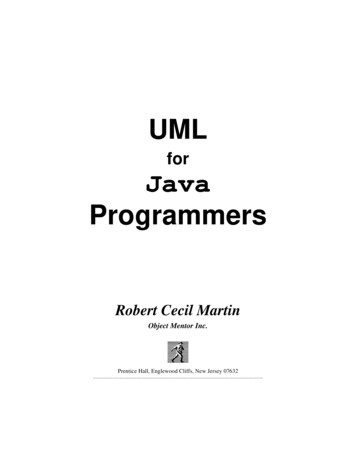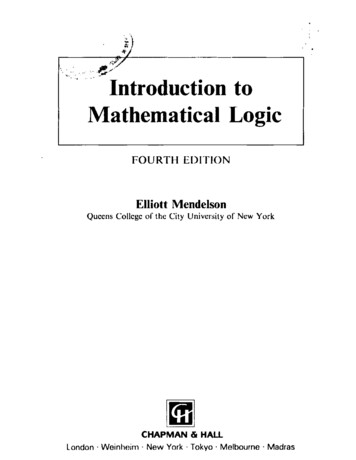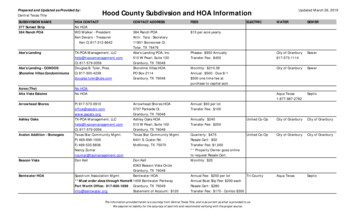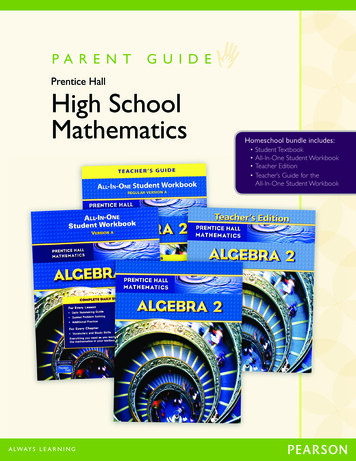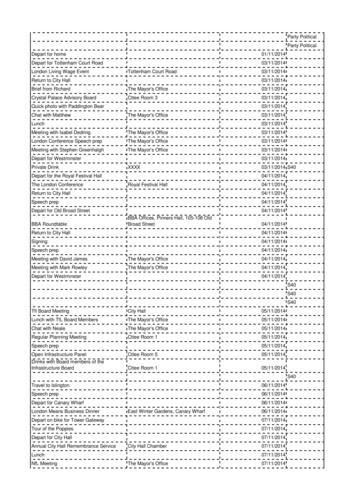
Transcription
Ashley HallAthletic Handbook
Ashley Hall’s Athletic DepartmentGeneral InformationAddress:172 Rutledge Ave.Charleston, SC 29403School Phone Number:722-4088Athletic DirectorFranny SlayAssistant Athletic DirectorJodie RunnerAthletic TrainerWendy Dammai843-720-2869843-965-8510843-697-9947Athletic Department Phone NumbersFranny Slay720-2869Mary Gastley720-2851Gail Bailey720-2883Maggie Laney965-8468Jodie Runner965-8510Athletic Department Fax #School ww.ashleyhall.orgSchool Administrator and AssistantsHead of SchoolJill MutiSchool SecretaryCori HerringDirector of Upper SchoolMary SchweersUpper School Administrative Assistant Meredith Oxley7th/8th Grade AdministratorChris HughesDirector of Intermediate ProgramLois RuggieroIntermediate Program Admin. Assistant Leslie 8451720-2865
Ashley Hall SchoolDepartment of Physical Education and AthleticsPhysical Education/Athletic StaffAthletic Director – Franny SlayPhysical Education Staff/ JV and Varsity Volleyball – Franny SlayPhysical Education Department Staff/ Varsity Tennis – Mary GastleyPhysical Education Staff / Varsity Cross Country / Varsity Track – Gail BaileyAquatics Director/Physical Education Department Chair/ andVarsity Swim Coach-Maggie LaneyAssistant Athletic Director, Basketball Director/Coach, Sports InformationDirector, Physical Education Staff-Jodie RunnerDance – Stephanie ChristensenFall Sports Coaching StaffVarsity Tennis – Mary GastleyJV Tennis – Amie PierceJV and Varsity Volleyball – Franny Slay, -assistant - Hayley HarrellBantam Volleyball – Mackall Horres, Becky Grantham, Liz Bailey,JV and Varsity Sailing – Tim FitzgeraldCross Country – Gail BaileyVarsity Swimming – Maggie LaneyVarsity Golf – Terese Dynjan, Jon WatkinsEquestrian Team –Heidi Ravenel, Emily HertzWinter Sports Coaching StaffVarsity Basketball – Jodie RunnerJunior Varsity Basketball – Jodie RunnerBantam Basketball – Mark Bowden, Arden Hare, Dana Molony,Archery – Anna RuggieroSpring Sports Coaching StaffVarsity Track – John Slepetz and Gail BaileyVarsity Soccer – Marc Simpson, Assistants – Andrea Muti, Sarah EvansVarsity Sailing – Tim FitzgeraldLacrosse – Kristen Callahan
CoachJodie RunnerSportAD & JV and VarsityVolleyballAsst. AD/Basketball/SportsInfoAmie PierceJV TennisFranny SlayCell843-7291273304-5824765Mary GastleyVarsity TennisGail BaileyCross Country/Varsity TrackMaggie LaneyVarsity Swimming364-7696Tim FitzgeraldJV/Varsity SailingVarsity GolfHeidi RavenelJV/Varsity RidingEmily HertzJV/Varsity ercea@ashleyhall.org843-437174084304371741Terese rjrc.comemilyhertz@gmail.comBantam VolleyballMackall HorresBantam VolleyballLiz BaileyBantam VolleyballBecky GranthamBantam VolleyballJodie RunnerJV/Varsity BasketballMark BowdenLucy BuxtonBantam BasketballBantam BasketballDana MolonyBantam BasketballArden HareBantam 52142molonyd@ashleyhall.orgarden44@gmail.comBantam BasketballAnna RuggieroArchery843-8135183John SlepetzVarsity Track437-1171jslepetz@hotmail.comMarc SimpsonVarsity Soccersimpsonm@ashleyhall.orgKristen CallahanLacrosse906-04725082803941Hayley HarrellAssistant VolleyallAssistant SoccerSarah EvansAssistant SoccerWendy DammaiAthletic .comNeShonda Brown Assistant BasketballAndrea 979947wmdammai@yahoo.com
Mission of AthleticsAshley Hall, an independent girls’ preparatory school, designs programs “so thateach student experiences a wide range of opportunities to achieve her potential,and grows in self-esteem, intellect, and spirit.” This is as true in physicaleducation, intramural activities, and interscholastic athletics as it is in any otherarea of the school’s programs. Athletic opportunities are “planned andimplemented by an outstanding faculty and staff and supported by a strongcommunity of parents, friends, alumnae, and trustees.”The goal of athletics at Ashley Hall, both internally and externally, is to teachstudents skills, team concepts, independent responsibility, and how to enjoyskills in a competitive setting.The Objective of SportsVarsity Allow committed, qualified students the opportunity to participate on teamssponsored by the school To refine skills and game strategies To provide stimulating practice sessions and appropriate levels ofcompetition To allow playing time as determined by the student athlete’s ability,commitment, and academic responsibility To encourage the development of mature responses to facing challenges To further develop and enhance sportsmanship, leadership, loyalty, andcommitment To require self-discipline and a strong work ethicJunior Varsity To prepare junior varsity team athletes, through appropriate competition, forparticipation in varsity To emphasize and develop skills and strategies To provide stimulating practice sessions and appropriate competition toallow opportunity for success To allow playing time in practice and games over the course of the season sothat athletic maturity may be gained To allow for the development of sportsmanship, leadership, loyalty, andcommitment To encourage self-discipline and a strong work ethic in sports as well asacademics
Bantam (Grades 5-basketball and tennis only),6, 7, & 8) To allow all students an opportunity to make a commitment to compete onathletic teams sponsored by the school To teach fundamental skills and introduce game strategies To provide stimulating practice sessions and appropriate competition To allow the opportunity for success To allow playing time in games and practices over the course of the season sothat each member gains the experience of competition To introduce self-discipline and a strong work ethic To recognize success and progress throughout the season as skills aremastered, as team unity develops, and as sport strategies are realizedDevelopmental Sports To prepare interested students to play a game following rules and developingteam concepts To provide those willing to commit themselves to learning an activity theopportunity, through planned practices To develop an appreciation for the challenge of sport and an increased desireto improve skills To promote self-discipline and responsibility among would-be athletes
Athletic Philosophy StatementThe primary goal of competition is to win. It is why our players spendhours of their time in practice; it is why we as coaches provide the athlete withthe skills and knowledge needed to reach this goal; it is why the development ofthe team unity is stressed as a vital component in the success of our program.However, winning is not our only goal, nor is it the measure of asuccessful program. Win or lose, building character in each of our players isthe ultimate goal of our program because character extends beyond the athleticfield and into everyday life. There are three major areas in which players canexperience personal growth through participation in competitive athletics.Self-Development - Players gain confidence, not just from winning, but fromcontinuing to improve and eventually mastering each skill. Players learn how toencourage and work together with other members of the team, even if they arenot friends off the athletic field. Players learn to be responsible by attendingpractices, being on time and maintaining good academic standing. Players learnto be accountable for their behavior on and off the court. Performing skillsincorrectly, giving less than 100 percent, and violating team rules aredetrimental, not only to the individual player but to the team.Overcoming Adversity - If athletics teaches us nothing else, it teaches us that lifeis not fair. Officials’ calls do not seem to go our way, everyone does not getequal playing time, and some people are naturally better athletes than others. Aplayer’s response to these situations can either push a team toward success orguarantee failure. I can try hard, or I can quit. I can make my teammates better,or I can complain about my lack of playing time. I can continue to work hardeven when I do not receive awards or recognition. Learning to respondpositively will help the athlete overcome adverse situations, not only in athleticcompetition, but also in academics or a future career.Keeping Failure in Perspective - Most teams will not win state championships;in fact, many will not even win a conference championship or have a winningrecord. Every player, no matter what the skill level, will make mistakes. Itseems that failure is inevitable, yet most athletes choose to continue competingand practicing rather that quit. They refuse to become complacent or drown inself-pity, focusing on the failure. By keeping failure in perspective, they havelearned to reflect, not dwell, on mistakes and to evaluate, win or lose, thesuccessfulness of each performance.It is Ashley Hall’s desire to build an athletic program with a winningtradition. It is also our desire to help our athletes develop qualities that willenable them to achieve success, not only on the athletic field but in futureendeavors as well.Copyrighted by Coaches’ Quarterly and John Wooden’s Pyramid of Success.
Athletic OpportunitiesFallWinterSpringJV and Varsity TennisBantam, JV, and Varsity VolleyballVarsity GolfVarsity Cross CountryJV and Varsity SwimmingVarsity GolfJV and Varsity Equestrian (all year)JV and Varsity Sailing (all year)Varsity BasketballJV BasketballBantam BasketballArcheryVarsity TrackVarsity SoccerJV SoccerLacrosseBantam LacrosseBantam TennisArcheryAll Ashley Hall students in grades 6-12 are invited to try-out for athletic teams.In cases where teams must be chosen, the athletic department puts its faith inthe professional judgment of its coaching staff in assessing student-athleteability and selecting an appropriate team in a fair and impartial manner.(Please note that students in grade 5 are eligible to play Bantam Basketball,Bantam Tennis, and non-contact junior varsity sports if the coach feels likethey are ready to compete at this level).Interscholastic Participation for Student-AthletesTeam PoliciesEstablishing criteria for making a particular team and/or the number ofstudents on a given team is the responsibility of the athletic director and therespective head coach. Teams may be comprised of students in the followinggrade levels.Varsity Level Teams-grades 6-12(Excluding contact sports such as basketball, soccer, and lacrosse)Junior Varsity Level Teams-grades 5-10Bantam Level Teams – grades 6 - 8 (volleyball)Bantam Level Teams – grades 5 - 8 (basketball)Bantam Level Teams– grades 4 - 8 (tennis)
Varsity Teams**At the varsity level, the goal is to field a team that will be competitive.Therefore, the commitment and expectations are greater. Student athletes arerequired to attend every practice and game, even during the holidays and breakswhere events might be scheduled. The basic requirements for a student athleteto play on a varsity team are as follow: a player must possess a high level ofSKILL, she must demonstrate KNOWLEDGE of the game and team strategy,she must display a real COMMITMENT to the team and she must put forth herbest WORK ETHIC at all times. Team members may be from any grade levelfrom the 6th grade on with the exception of contact sports.Junior Varsity Teams**At the junior varsity level the goals are participation, sportsmanship and thedevelopment of basic skills and leadership. The basic requirements for a studentathlete to play on a JV team are as follows: ATTENDANCE at all practices, aplayer must demonstrate a WILLINGNESS to learn and be able to apply whatthey learned in a game situation, and she must also put forth her best EFFORT.The junior varsity level also seeks to prepare student athletes for the morecompetitive varsity level by enhancing skills and promoting a commitment toteam, physical fitness and development.Bantam TeamsThe purpose of the bantam team level of participation is to initiate thedevelopment of fundamental skills, sportsmanship, and prepare students forjunior varsity and varsity level competition. Coaches will be aware of what thejunior varsity and varsity team is doing and will try to implement the sameterminology and program.Starting practice dates for Bantam, Junior Varsity and Varsity Teamsrequiring mandatory attendance are as follows:Fall Sports – first week in AugustWinter Sports – first week of NovemberSpring Sports – first week of FebruaryPlease note that the head coach will notify the team of the exact dates of the firstpractice. These dates mark the first day that a coach may begin required practicesessions for their team. However, any student-athlete involved with a teamwhose season is still in progress may not practice with the next season’s teamuntil the current season has ended unless special arrangements are made withthe head coach of the team whose season is still in progress.
Mandatory Sports MeetingsAt the beginning of each new sports season; fall, winter and spring, the AthleticDepartment is mandated by SCISA, our Athletic Organization, to hold informationalparent meetings. It is MANDATORY that at least one parent is there to represent theathlete, regardless of how many times you have attended before. This is an opportunityto hear about our policies and procedures as well as meet your child’s coach. Those thatdo not attend will likely miss very valuable information. It will also be documented thatyou were not in attendance. It will be very unfortunate if during the season, a situationarises that is a result of something you missed during the meeting.Athletic Policies and Expectations for Students and ParentsIn an effort to provide its students with a variety of experiences, Ashley Halloffers a substantial interscholastic program in a number of sports. Becauseparticipants in interscholastic competition represent the school to the public, theymust observe the following policies. (Coaches should go over this with theirteams).For Student Athletes Maintain academic work in conformance with Ashley Hall’s academicpolicy. Conform to school rules concerning the use of tobacco, alcohol, and drugs. Attend all practices, meeting and games, including practices and gamesscheduled during school holidays and vacations. Respect the authority and judgment of coaches, captains, andadministrators. Abstain for the use of profanity at any time while representing the school. Maintain self-control before, during and after all practices and games. Will before, during, and after contests, be respectful and polite toopponents. Will commend good play and good sportsmanship whether displayed bya teammate or by an opponent. This should take place, win or lose. Appreciate the responsibility of officials and both respect and accept theirdecisions. Respect the property of the school and treat this property with care. Allschool property that is issued must be turned in at the end of the season ingood condition. Student athletes will be charged for items lost or in poorcondition. Captains of teams will make every effort specifically to thank officials andopposing coaches after contest. Student athletes will conduct themselves in such a manner that will neverbe a discredit to themselves, their team, or the school.
All student athletes should fully understand the above regulations. Theyshould realize that failure to comply with any of these rules or regulationscould result in suspension from the team, plus any other action deemednecessary by the Athletic Director or school administration.For Parents Student athletes who sign up for and interscholastic team make acommitment to attend all games and practices including practices andgames scheduled during the school holidays and vacations. Parents areasked to avoid scheduling family obligations in conflict with practiceand game schedules. Parents are also encouraged to attend as maycontests as possible. Parents will be responsible for promptly picking up student athletesafter practices and games.o From home games and practices at the game or practice siteo After away games, student athletes will be transported to, andmust be picked up from Ashley Hall. Attending an interscholastic contest, parents are asked to set anexample of good sportsmanship. Parents are urged to support ourteams, but they should at all times be respectful of criticism. Parents, as well as student athletes, are responsible for all schoolproperty issued to a player. Any lost or damaged school property willbe the financial responsibility of the player’s parents.
Ashley Hall PoliciesAcademic GuidelinesTo be eligible to compete on any interscholastic team student-athletes maynot have an (F) from the preceding report period. Once the season begins,grades will be checked at the interim and at the end of each marking period.Students who do not meet academic requirements at the beginning of theseason or during the season will have two weeks to bring all grades to passingstatus before being dropped from the team. Only one two-week period isallowed per sport.If a student meets the requirements but is experiencing difficultymaintaining her average, administrators and coaches reserve the right torecommend termination from the team.Practice and Game AttendanceStudent-athletes are expected to attend all practices and games. It is theresponsibility of the student-athlete to organize her time and priorities so thatcommitments to both academics and athletics are fulfilled. It is also theresponsibility of the student-athlete to notify the classroom teachers of absencesfrom class at least one day prior to the absence when the absence is caused by anathletic contest. The student-athlete is responsible for all make-up workresulting from such an absence. All student-athletes are expected to be at schoolon time the day following an athletic contest. A concerted effort is made toschedule games so that a minimum of class time is missed.In order for a student-athlete to be able to participate in a practice or agame, she must be in attendance the entire day of the day in question.Exceptions to this policy must be approved by the principal and A.D.Any team member who is injured but able to attend school is expected tobe at all practices and games unless personally excused by the head coach.Physical limitations do not preclude an athlete from being able to assist the teamin some way.Each coach will inform the student-athlete of their rules and regulationsregarding practice and game attendance.Away ContestsIf a school van is used in an away contest, student-athletes are to returnfrom athletic trips via school transportation unless the coach allows the studentto return with her parents. Parents’ approval must be confirmed in writing inadvance if a student is to ride with adults other than that student’s parents.**Please note: Parents wishing to transport any students, other than their own,must be approved to drive. Once the paperwork is filled out and your drivingrecord is checked, you will be notified whether or not you are eligible to drive.Parents will only need to have this checked once a year.
BehaviorStudent-athletes are expected not to be disruptive at any time during theschool day. Student-athletes should conduct themselves with poise and integrityand as role models, particularly for younger students. Student-athletes mustrespect the judgment and decisions of coaches and officials. Student-athletesmust also respect teammates and opponents. Any disagreements with coaches,officials, teammates, opponents or fans will be handled by the head coachimmediately. Profanity will not be tolerated at any time during the season.TransportationTransportation to and from the Sports Complex on Johns Island will be providedfor Spring Sports. The Ashley Hall bus leaves school at 3:30 and returns atapproximately 6:30. Please be on time to pick up your students when they returnto school.Season PassesSeason passes are available to all home bantam, junior varsity, and varsityvolleyball and basketball games. The cost of an adult pass is 30.00. A nonAshley Hall student pass is 15.00. If you would like to purchase a season pass,please send a check for the appropriate amount to the athletic department orpurchase it at your first game. Note: These passes are only good for games andmatches played at Ashley Hall.Grandparents: All grandparents will be admitted free of charge if the family hasa season pass!Drinks, Door, and ConcessionsAll parents are asked to work the door or the concession stand at specific timesduring their daughter’s season. You will also be asked to provide drinks for theteam after games. You will be notified by the team parent of your shift/drinkschedule. It is very important that you be at the gym at least 30 minutes prior togame time. Traveling teams get here very early and we lose money at the door ifthere is not someone there to collect. The concession stand also needs to be setup prior to and cleaned up after the game.When sending drinks for the team, please provide fruit drinks, water or SportsDrinks. Please do not send soft drinks.
Substance Abuse PolicyThe use of alcohol, tobacco or illegal drugs by a student-athlete at any timeduring any season in which she participates is prohibited. Any team membercaught violating this rule will result in probation and suspension for the next twocompetitions played.The second offense will result in immediate termination from any further play inany sport during the year.This agreement is in effect for the entire year. A penalty will carry over fromseason to season, therefore.The Physical Education/Athletic Department endorses this policy for reasons ofhealth, hygiene, and optimal physical performance.Coaches reserve the right to impose additional penalties.There may be sanctions imposed administratively or through the Honor Council,since team members are school representatives (see handbook).*****We have read the above policy and agree to adhere to the rules as they are stated. Weunderstand that I may not participate in any sport until my parent/guardian and I havesigned and returned this form to the Physical Education/Athletic Department.Signature (student)DateSignature (parent)Date
Code of Sportsmanship and ConductAshley Hall conducts an interscholastic athletic program in the belief thatcompetitive team experiences contribute significantly to the development ofcharacter and integrity of our student body and to the generation of school spirit.Sportsmanship and fair play are invaluable components of such a program.We expect our coaches, players, faculty and students to represent AshleyHall in a manner that is respectful of others both on and off the field of play. It isour objective to develop and maintain the highest standards of courtesy,emotional discipline and good sportsmanship.We encourage the enthusiastic support of parents and friends. Weexpect adults to uphold the same high standards that we ask of our studentathletes.Ashley Hall will not tolerate any spectator, either student or adult,whose behavior is disrespectful to players, officials, coaches, or otherspectators. We desire that all concerned have the opportunity to look forwardto and enjoy athletic competition of the highest quality at our school.Section I.Section II.Article XV – SCISAA Code of ConductAthletes, coaches, and fans shall at all time conduct themselves in areasonable and sportsmanlike manner, reflecting full and true creditto the school they represent.An athlete, coach, or fan will be in violation of Section I uponany one or more of the following:A. By making any degrading remark about the official, coach, orathlete during or after a game, either on or off the field/floor ofplay.B. By arguing with an official(s) or going through motionsindicating dislike/disdain for a decision.C. By making any degrading remarks or criticism of any official,coach, athlete, or school to the media.D. By using foul, abusive, or profane language at any time.E. By hitting, shoving, or striking any official, coach, athlete, or fanat anytime (or attempting to do so).F. By being ejected form any contest.G. The use and/or display of alcoholic beverages, tobacco(including smokeless types), or other controlled substances isstrictly prohibited at any SCISAA event.H. By detaining an official following the contest to request a rulingor explanation of actions taken by the official.I. It shall be considered unsportsmanlike conduct for a schoolofficial to remove a team from the playing area before a game iscompleted.
Parent/Coach Communication-Parent/Coach RelationshipBoth parenting and coaching are extremely difficult vocations. By establishingan understanding of each position, we are better able to accept the actions of theother and provide greater benefit to children.Communications you Should Expect from Your Child’s Coach Philosophy of the coach Expectations the coach has for your child as well as all the players on theteam Location and times of all practices and contests Team requirements, i.e. fees, special equipment, off-season conditioning Procedure should your child be injured during participation Discipline that results in the denial of you child’s participationCommunication Coaches Expect From Parents Concerns expressed directly to the coach Notification of any schedule conflicts well in advance Specific concern in regard to a coach’s philosophy and/or expectationsAs your children become involved in the programs at Ashley Hall it isimportant to understand that there may be times when things do not go theway you or your child wishes. At these times discussion with the coach isencouraged.Appropriate Concerns to Discuss With Coaches The treatment of your child mentally and physically Ways to help your child improve Concerns about your child’s behaviorIt is very difficult to accept your child’s not playing as much as you may hope.Coaches are professionals. They make judgment decisions based on what theybelieve to be best for all students involved. Certain things can and should bediscussed with your child’s coach. Other things such as those below must be leftto the discretion of the coach.Issues Not Appropriate to Discuss With Coaches Playing time Team strategy Play calling Other student-athletes
There are situations that may require a conference between the coach and theparent.The Procedure You Should Follow if you Have A Concern To Discuss With ACoach Call to set up an appointment with the Coach Please do not attempt to confront a coach before or after a contest orpractice. These can be emotional times for both the parent and the coach.Meetings of this nature usually do not promote resolution.The Next StepWhat can a parent do if the meeting with the coach did not provide a satisfactoryresolution? Set up an appointment with the Athletic Director to discuss the situation.
Ashley Hall Sports MedicineManagement and Policy for ConcussionsA concussion is a mild traumatic brain injury that is “characterized by immediate and temporary impairment ofneural functions, which may include headache, nausea, alteration of consciousness, disturbance of vision orequilibrium, etc, due to traumatic mechanical forces, direct or indirect, to the brain”. A concussion can occur withor without a loss of consciousness, and proper management is essential to the immediate safety and long-term futureof the injured individual. A challenging aspect in managing a concussion is recognizing the injury, especially whenthere could be little to no signs that a concussion occurred. A simple “ding” or “bell-rung” should not be dismissed,but this stunned, confused mental state most often reflects that a concussion is actually present.It should also be noted that “young athletes may take longer for recovery than older athletes” due to an immaturebrain, and that “females seem to have worse outcomes from a concussion than males”. Adolescent athletes aresusceptible to post-concussion syndrome (concussion symptoms lasting for an extended period of time), and secondimpact syndrome (sustaining a second head injury before the concussion has healed). Returning an athlete back toplay before the brain has fully healed could have a catastrophic impact on the athlete. The latest research and SouthCarolina Legislation calls for a conservative approach towards management.Signs and Symptoms of a ConcussionParents and athletes must understand that it is her or her responsibility to report concussion signs and symptoms. Aswell, coaches and staff must report any forceful bump, or jolt to the head or body that resulted in the rapidmovement of the head.Signs and symptoms of a concussion may include but are not limited to the following: HeadacheNauseaVomitingDizzinessRinging in the earsBlurred VisionUnequal, dilated, orunreactive pupilsJerky eye movementSeeing “stars”Seeing double or othervision impairmentsSensitivity to light ornoiseSlurred speechDrowsinessEasily distractedFatigueFeeling “in a fog”Stunned or dazed look,glassy eyedFeeling “slowed down”Poor balance and/orcoordinationInappropriate emotions,emotions out of the normIrritabilityPersonality change“Blacked out”Loss of consciousness Loss of orientationMemory problemsPoor concentrationAbnormal vital signsUpdated Fall 2015wd
It should be understood that the reporting and evaluation of symptoms may not be entirely reliable. Thiscould be due to the effects of a concussion or because of the athlete’s passionate desire to return tocompetition outweighs
Ashley Hall's Athletic Department General Information Address: 172 Rutledge Ave. Charleston, SC 29403 School Phone Number: 722-4088 Athletic Director 843-720-2869 Franny Slay Assistant Athletic Director 843-965-8510 Jodie Runner

